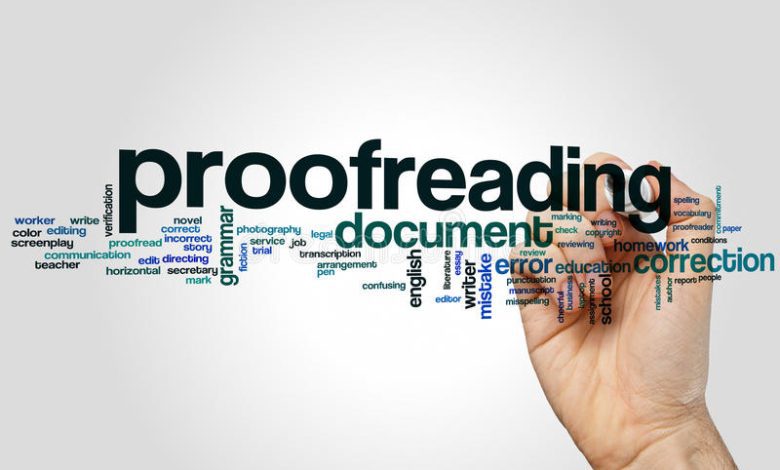Why Proofreading is Mandatory After Completing Your Thesis?

Your thesis is the result of many hours of research, reading, revising, and writing. It is the final part of your qualification, whether it be your first degree, master’s degree, or PhD.
Spelling and grammatical errors, inconsistencies in layout and formatting, and improper references will distract your examiner from your brilliance. It is well worth your time to proofread your thesis.
Receiving bad feedback on your writing is stressful. However, your supervisor is correct in pointing out how grammatical errors harm your work. Therefore, you need to improve your proofreading skills. These errors may have a significant negative impact on your work if this is not done (Kim, 2018).
Most students simply have friends or colleagues review their work, although they may have their limitations in terms of text writing proficiency. Instead, students can also seek Proofreading Services at this important stage.
Why is proofreading important?
Proofreading is an important part of the writing process. They help the efficacy of your writing style as well as the clarity of your ideas (professionalessayservice, 2019).
Effective proofreading is essential for producing high-quality documents, whether academic or professional. When done, correctly, and thoroughly, proofreading can be the difference between writing something that communicates effectively or creating a massive misunderstanding. It could also mean the difference between acceptance and rejection of the thesis.
Language and text analysis are important for error detecting:
Grammar and numbering errors- such as number forms, short and scientific forms, degrees of comparison, and so on.
Spelling errors- include basic misspellings, inappropriate usage of synonymy (words that sound similar but have different meanings, typographical errors, and so on.
Inconsistency in document format – this can be as simple as font, spacing, and justification standards, or it can be the standard format.
Punctuation errors- include missing or excessive commas, periods, and/or poorly used quotation marks.
Misplaced words – using the right words improves the quality of your work.
Sentence structure errors– paragraphs that are poorly constructed
There are many ways to improve it. If writing isn’t one of your strengths or if English isn’t your first language, like Pakistani students, you may face problems in thesis writing. So, using a professional proofreader service such as the PhD Thesis Pakistan writing service can be a worthwhile investment.
Here are tips you should keep in mind when proofreading your thesis:
-
Before proofreading, use digital editing software
Spelling and grammar-checking software can be very useful in ensuring that your written work is error-free. Furthermore, you can polish it by correcting spacing issues and adding bullets, tables, and paragraphs. However, the spell checker in Microsoft Word or any other spell-checking software may miss homonyms and typos.
-
Pay close attention and take your time
Make sure there are no distractions around you before you start proofreading. If possible, turn off your phone and avoid checking your email for a while. Make yourself at ease with proper seating and lighting, and you’re ready to go!
You can try covering the lines before and after the text, you’re currently reading. When you read, your eyes tend to skip ahead, and this tip prevents this from happening.
-
Proofread only after the final revision
If you are still working on your thesis, now is not the time to check your written work. Write first, then edit, and finally proofread.
Additionally, try to pause writing and proofreading. It can extend from an hour to a week. This helps clear your mind of the remnants of the written work, giving you breathing space and a new perspective, allowing you to notice errors more quickly and easily.
-
Backward reading
When you read your work forwards, your brain will automatically correct any errors in your mind because it already knows what you wanted to write. This leads you to miss errors while proofreading. To break this pattern, start at the bottom and work your way up, sentence by sentence.
This allows your brain to concentrate on single sentences. When you’re finished, you can read forwards again for the final run-through.
-
Read it aloud
When you read aloud, you are more likely to catch mistakes and missing commas. Reading a written work silently prevents you from focusing on individual words and may cause you to overlook errors such as run-on sentences and phrases which simply do not sound correct.
-
Check your punctuation in Proofreading
Comma splices, apostrophe problems, missed quotation marks, incorrect capitalization, and other punctuation errors are all too common. So, when editing your work, don’t overlook the significance of those small symbols. They have the power to change the meaning of your sentence!
-
Keep an eye out for homonyms for Proofreading
MS Word spell check will not pick detect homonym errors. Homonyms are words that have similar pronunciations but different meanings and, often, different spellings.
If you write ‘their’ instead of ‘there,’ or ‘complement’ instead of ‘complement,’ you may make a big error that changes the meaning of a statement. Pay close attention to homonyms.
-
Put it on paper
You must proofread your written work in printed or written form rather than any digital device – computer, smartphone, or tablet. A recent Scientific American article discussed how reading on paper versus reading on a screen differs in how people comprehend the information.
Thus, reading from paper will help you discover mistakes much more than reading from a digital screen. Mark the errors on paper and fix them on the screen.
-
Double check numerical values While Proofreading
If you add a zero to a price listed in your document by mistake, or if you lose the full stop while writing, it might have far-reaching consequences and can cause a lot of embarrassment. So always double-check any numerical values you include in your work.
Conclusion
Before submitting a written document, it is mandatory to proofread it to find errors in grammar, vocabulary, formatting, and structure.
It is important to proofread your thesis. Proper spelling and punctuation and removal of unnecessary words give your writing a professional look and ensure that your reader understands you. Poor proofreading can lead to embarrassment, misunderstandings, and possibly fewer career opportunities.
Reference
Kim, J., 2018. Same bed, different dreams: The mismatched expectations about proofreading in the writing center. International Journal of Research, 7(4), pp.89-103.
PES, 2019. 7 Tips To Help You Proofread Your Essay Like A Pro. Online available at https://www.professionalessayservice.co.uk/7-tips-to-help-you-proofread-your-essay-like-a-pro/ [Accessed date: 1-Aug-19]






